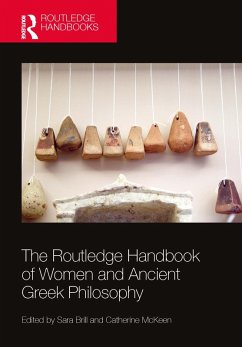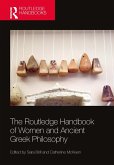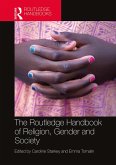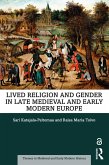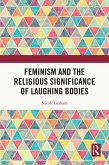The Routledge Handbook of Women and Ancient Greek Philosophy (eBook, ePUB)
Redaktion: Brill, Sara; McKeen, Catherine
46,95 €
46,95 €
inkl. MwSt.
Sofort per Download lieferbar

23 °P sammeln
46,95 €
Als Download kaufen

46,95 €
inkl. MwSt.
Sofort per Download lieferbar

23 °P sammeln
Jetzt verschenken
Alle Infos zum eBook verschenken
46,95 €
inkl. MwSt.
Sofort per Download lieferbar
Alle Infos zum eBook verschenken

23 °P sammeln
The Routledge Handbook of Women and Ancient Greek Philosophy (eBook, ePUB)
Redaktion: Brill, Sara; McKeen, Catherine
- Format: ePub
- Merkliste
- Auf die Merkliste
- Bewerten Bewerten
- Teilen
- Produkt teilen
- Produkterinnerung
- Produkterinnerung

Bitte loggen Sie sich zunächst in Ihr Kundenkonto ein oder registrieren Sie sich bei
bücher.de, um das eBook-Abo tolino select nutzen zu können.
Hier können Sie sich einloggen
Hier können Sie sich einloggen
Sie sind bereits eingeloggt. Klicken Sie auf 2. tolino select Abo, um fortzufahren.

Bitte loggen Sie sich zunächst in Ihr Kundenkonto ein oder registrieren Sie sich bei bücher.de, um das eBook-Abo tolino select nutzen zu können.
An essential reference source for cutting-edge scholarship on women/gender and philosophy in Greek antiquity. The volume features original research that crosses disciplines, offering readers an accessible guide to new methods, new sources, and new questions in the study of ancient Greek philosophy and its multiple afterlives.
- Geräte: eReader
- ohne Kopierschutz
- eBook Hilfe
- Größe: 6.15MB
Andere Kunden interessierten sich auch für
![The Routledge Handbook of Women and Ancient Greek Philosophy (eBook, PDF) The Routledge Handbook of Women and Ancient Greek Philosophy (eBook, PDF)]() The Routledge Handbook of Women and Ancient Greek Philosophy (eBook, PDF)46,95 €
The Routledge Handbook of Women and Ancient Greek Philosophy (eBook, PDF)46,95 €![The Routledge Handbook of Religion, Gender and Society (eBook, ePUB) The Routledge Handbook of Religion, Gender and Society (eBook, ePUB)]() The Routledge Handbook of Religion, Gender and Society (eBook, ePUB)44,95 €
The Routledge Handbook of Religion, Gender and Society (eBook, ePUB)44,95 €![The Routledge Handbook to Religion and Political Parties (eBook, ePUB) The Routledge Handbook to Religion and Political Parties (eBook, ePUB)]() The Routledge Handbook to Religion and Political Parties (eBook, ePUB)46,95 €
The Routledge Handbook to Religion and Political Parties (eBook, ePUB)46,95 €![Lived Religion and Gender in Late Medieval and Early Modern Europe (eBook, ePUB) Lived Religion and Gender in Late Medieval and Early Modern Europe (eBook, ePUB)]() Sari Katajala-PeltomaaLived Religion and Gender in Late Medieval and Early Modern Europe (eBook, ePUB)41,95 €
Sari Katajala-PeltomaaLived Religion and Gender in Late Medieval and Early Modern Europe (eBook, ePUB)41,95 €![Feminism and the Religious Significance of Laughing Bodies (eBook, ePUB) Feminism and the Religious Significance of Laughing Bodies (eBook, ePUB)]() Nicole GrahamFeminism and the Religious Significance of Laughing Bodies (eBook, ePUB)42,95 €
Nicole GrahamFeminism and the Religious Significance of Laughing Bodies (eBook, ePUB)42,95 €![The Routledge Handbook of Religion and the Body (eBook, ePUB) The Routledge Handbook of Religion and the Body (eBook, ePUB)]() The Routledge Handbook of Religion and the Body (eBook, ePUB)46,95 €
The Routledge Handbook of Religion and the Body (eBook, ePUB)46,95 €![Routledge Revivals: Moslem Women Enter a New World (1936) (eBook, ePUB) Routledge Revivals: Moslem Women Enter a New World (1936) (eBook, ePUB)]() Ruth Frances WoodsmallRoutledge Revivals: Moslem Women Enter a New World (1936) (eBook, ePUB)40,95 €
Ruth Frances WoodsmallRoutledge Revivals: Moslem Women Enter a New World (1936) (eBook, ePUB)40,95 €-
-
-
An essential reference source for cutting-edge scholarship on women/gender and philosophy in Greek antiquity. The volume features original research that crosses disciplines, offering readers an accessible guide to new methods, new sources, and new questions in the study of ancient Greek philosophy and its multiple afterlives.
Dieser Download kann aus rechtlichen Gründen nur mit Rechnungsadresse in A, B, BG, CY, CZ, D, DK, EW, E, FIN, F, GR, HR, H, IRL, I, LT, L, LR, M, NL, PL, P, R, S, SLO, SK ausgeliefert werden.
Produktdetails
- Produktdetails
- Verlag: Taylor & Francis eBooks
- Seitenzahl: 700
- Erscheinungstermin: 29. März 2024
- Englisch
- ISBN-13: 9781003809418
- Artikelnr.: 70215050
- Verlag: Taylor & Francis eBooks
- Seitenzahl: 700
- Erscheinungstermin: 29. März 2024
- Englisch
- ISBN-13: 9781003809418
- Artikelnr.: 70215050
- Herstellerkennzeichnung Die Herstellerinformationen sind derzeit nicht verfügbar.
Sara Brill is Professor of Philosophy at Fairfield University in Fairfield, CT, USA. She works on the psychology, politics, and ethics of Plato and Aristotle, as well as broader questions of embodiment, life, and power as points of intersection between ancient Greek philosophy and contemporary critical theory. She is the author of Aristotle on the Concept of Shared Life (Oxford UP, 2020) and Plato on the Limits of Human Life (Indiana UP, 2013), and co-editor of Antiquities Beyond Humanism (with Emanuela Bianchi and Brooke Holmes; Oxford UP, 2019). Catherine McKeen is a philosopher whose work engages questions about women, gender, and community in Plato's political philosophy. She teaches at Bennington College in Bennington, VT, USA.
1. Introduction
Sara Brill and Catherine McKeen
Part I: 700-400s BCE
2. The Way Up and Down: Liminal Agency in The Homeric Hymns and Presocratic Philosophy
Jessica Elbert Decker
3. Sappho of Lesbos and the Time of Erosophy
Chelsea C. Harry
Sara Brill and Catherine McKeen
Part I: 700-400s BCE
2. The Way Up and Down: Liminal Agency in The Homeric Hymns and Presocratic Philosophy
Jessica Elbert Decker
3. Sappho of Lesbos and the Time of Erosophy
Chelsea C. Harry
- Sex, Family, and Chthonic Justice: On the Cosmology of the Choephoroi - Kalliopi Nikolopoulou (SUNY Buffalo)
- Euripides on "Women's Rights?" Natural Philosophy and Epistemic Justice in the Fragments of Melanipp Soph and Desm tis - Dorota Dutsch (UC Santa Barbara)
- On Not-Believing: A Gorgianic Reading of the Tragic Cassandra - Maria Cecília de Miranda Nogueira Coelho (Universidade Federal de Minas Gerais)
- The Correctness of Grammatical Gender in the Sophistic Tradition - Chloe Balla (University of Crete)
- Eis gynaikos andra: Aeschines on Women, Eros, and Politics- Francesca Pentassuglio (Sapienza University of Rome)
- 'By Zeus,' Said Theodote: Women as Interlocutors and Performers in Xenophon's Philosophical Writings - Carol Atack (University of Cambridge)
- Women in Xenophon's Socratic Works - David M. Johnson (Southern Illinois University Carbondale)
- Socrates' Laughing Bodies: Women and Comedy in Plato's Phaedo - Sonja Tanner (University of Colorado, Colorado Springs)
- Plato's Argument for the Inclusion of Women in the Guardian Class: Prospects and Problems - Emily Hulme (University of Sydney)
- Women, Spirit, and Authority in Plato and Aristotle - Patricia Marechal (University of California, San Diego)
- Plato on Women and the Private Family- Rachel Singpurwalla (University of Maryland)
- Plato's Scientific Feminism: Collection and Division in Republic V's "First Wave" - John Proios (University of Chicago) and Rachana Kamtekar (Cornell University)
- Weaving Politics in Plato's Statesman - Jill Frank (Cornell University) and Sarah Greenberg (Cornell University)
- Midwifery as Metaphor in Plato's Theaetetus - Marina Berzins McCoy (Boston College)
- Divine Names and the Mystery of Diotima's Eponymy - Danielle Layne (Gonzaga University)
- Sexual Differentiation and What it Means to be Human in Timaeus - Jill Gordon (Colby College)
- Cyrenaics on Philosophical Education and Gender - Katharine R. O'Reilly (Toronto Metropolitan University)
- Wives or Philosophers? Hipparchia and the Cynic Criticism of Gendered Economics - Malin Grahn-Wilder (University of Jyväskylä)
- Diagnosing Aristotle's Sexism - Charlotte Witt (UNH)
- Women in Ancient Medical Texts as Sources of Knowledge in Aristotle - Mariska Leunissen (University of North Carolina)
- Aristotle's Hylomorphism Reconsidered Through Aristotle's Account of Generation - Adriel M. Trott (Wabash College)
- The Role of the Female in Aristotle's Teleology of Reproduction - Ana Laura Edelhoff (University of Konstanz)
- Aristotle on Women's Virtues - Sophia Connell (University of London)
- What is wrong with women. Aristotle's paradigm of gender, and its anomalies - Giulia Sissa (UCLA)
- Pythagorean Women: An Example of Female Philosophical Protreptics- Caterina Pellò (University of Geneva)
- Women in Stoicism - Jula Wildberger (American University of Paris)
- Pyrrhonian Skepticism on Gender and Virtue- Christiana Olfert (Tufts University)
- The Reception of Diotima in Later Platonism: Clea, Sosipatra and Asclepigeneia - Crystal Addey (University College Cork)
- The Place of Women in the Neoplatonic Schools - Alexandra Michalewski (Centre National de la Recherche Scientifique)
- The School of Hypatia and the Problem of the Gendered Soul - Aist Celkyt (Leiden University)
- Philosopher Queens and a Female Prospero(a): Plato's Republic and Shakespeare's Tempest - Arlene Saxonhouse (University of Michigan)
- "Possessed, Magical, and Dangerous to Handle": Jane Harrison, Nietzsche, and the Maenad Chorus- Laura McClure (University of Wisconsin-Madison)
- Women's Work: Exploring a Transhistorical Tradition of Inquiry with W. E. B. Du Bois, Anna Julia Cooper, and Aristotle - Harriet Fertik (The Ohio State University)
- Sarah Kofman: Socratic Lover - Paul Allen Miller (University of South Carolina)
- What Does it Mean to Decolonially Ruminate on a Classic? Medea, Sethe, and la Llorona - Andrés Fabián Henao Castro (University of Massachusetts Boston)
- Eros, the Elusive? A Dialogue on Plato's Symposium, Diotima and Women in Ancient Philosophy - Mariana Ortega (Pennsylvania State University) and a companion
II. 370s-340s BCE
III. 330s-320s BCE
IV. 320s BCE-400s CE
V. Later receptions
The Worth of Women: the Reception of Ancient Debates in the Renaissance - Marguerite Deslauriers (McGill University)
1. Introduction
Sara Brill and Catherine McKeen
Part I: 700-400s BCE
2. The Way Up and Down: Liminal Agency in The Homeric Hymns and Presocratic Philosophy
Jessica Elbert Decker
3. Sappho of Lesbos and the Time of Erosophy
Chelsea C. Harry
Sara Brill and Catherine McKeen
Part I: 700-400s BCE
2. The Way Up and Down: Liminal Agency in The Homeric Hymns and Presocratic Philosophy
Jessica Elbert Decker
3. Sappho of Lesbos and the Time of Erosophy
Chelsea C. Harry
- Sex, Family, and Chthonic Justice: On the Cosmology of the Choephoroi - Kalliopi Nikolopoulou (SUNY Buffalo)
- Euripides on "Women's Rights?" Natural Philosophy and Epistemic Justice in the Fragments of Melanipp Soph and Desm tis - Dorota Dutsch (UC Santa Barbara)
- On Not-Believing: A Gorgianic Reading of the Tragic Cassandra - Maria Cecília de Miranda Nogueira Coelho (Universidade Federal de Minas Gerais)
- The Correctness of Grammatical Gender in the Sophistic Tradition - Chloe Balla (University of Crete)
- Eis gynaikos andra: Aeschines on Women, Eros, and Politics- Francesca Pentassuglio (Sapienza University of Rome)
- 'By Zeus,' Said Theodote: Women as Interlocutors and Performers in Xenophon's Philosophical Writings - Carol Atack (University of Cambridge)
- Women in Xenophon's Socratic Works - David M. Johnson (Southern Illinois University Carbondale)
- Socrates' Laughing Bodies: Women and Comedy in Plato's Phaedo - Sonja Tanner (University of Colorado, Colorado Springs)
- Plato's Argument for the Inclusion of Women in the Guardian Class: Prospects and Problems - Emily Hulme (University of Sydney)
- Women, Spirit, and Authority in Plato and Aristotle - Patricia Marechal (University of California, San Diego)
- Plato on Women and the Private Family- Rachel Singpurwalla (University of Maryland)
- Plato's Scientific Feminism: Collection and Division in Republic V's "First Wave" - John Proios (University of Chicago) and Rachana Kamtekar (Cornell University)
- Weaving Politics in Plato's Statesman - Jill Frank (Cornell University) and Sarah Greenberg (Cornell University)
- Midwifery as Metaphor in Plato's Theaetetus - Marina Berzins McCoy (Boston College)
- Divine Names and the Mystery of Diotima's Eponymy - Danielle Layne (Gonzaga University)
- Sexual Differentiation and What it Means to be Human in Timaeus - Jill Gordon (Colby College)
- Cyrenaics on Philosophical Education and Gender - Katharine R. O'Reilly (Toronto Metropolitan University)
- Wives or Philosophers? Hipparchia and the Cynic Criticism of Gendered Economics - Malin Grahn-Wilder (University of Jyväskylä)
- Diagnosing Aristotle's Sexism - Charlotte Witt (UNH)
- Women in Ancient Medical Texts as Sources of Knowledge in Aristotle - Mariska Leunissen (University of North Carolina)
- Aristotle's Hylomorphism Reconsidered Through Aristotle's Account of Generation - Adriel M. Trott (Wabash College)
- The Role of the Female in Aristotle's Teleology of Reproduction - Ana Laura Edelhoff (University of Konstanz)
- Aristotle on Women's Virtues - Sophia Connell (University of London)
- What is wrong with women. Aristotle's paradigm of gender, and its anomalies - Giulia Sissa (UCLA)
- Pythagorean Women: An Example of Female Philosophical Protreptics- Caterina Pellò (University of Geneva)
- Women in Stoicism - Jula Wildberger (American University of Paris)
- Pyrrhonian Skepticism on Gender and Virtue- Christiana Olfert (Tufts University)
- The Reception of Diotima in Later Platonism: Clea, Sosipatra and Asclepigeneia - Crystal Addey (University College Cork)
- The Place of Women in the Neoplatonic Schools - Alexandra Michalewski (Centre National de la Recherche Scientifique)
- The School of Hypatia and the Problem of the Gendered Soul - Aist Celkyt (Leiden University)
- Philosopher Queens and a Female Prospero(a): Plato's Republic and Shakespeare's Tempest - Arlene Saxonhouse (University of Michigan)
- "Possessed, Magical, and Dangerous to Handle": Jane Harrison, Nietzsche, and the Maenad Chorus- Laura McClure (University of Wisconsin-Madison)
- Women's Work: Exploring a Transhistorical Tradition of Inquiry with W. E. B. Du Bois, Anna Julia Cooper, and Aristotle - Harriet Fertik (The Ohio State University)
- Sarah Kofman: Socratic Lover - Paul Allen Miller (University of South Carolina)
- What Does it Mean to Decolonially Ruminate on a Classic? Medea, Sethe, and la Llorona - Andrés Fabián Henao Castro (University of Massachusetts Boston)
- Eros, the Elusive? A Dialogue on Plato's Symposium, Diotima and Women in Ancient Philosophy - Mariana Ortega (Pennsylvania State University) and a companion
II. 370s-340s BCE
III. 330s-320s BCE
IV. 320s BCE-400s CE
V. Later receptions
The Worth of Women: the Reception of Ancient Debates in the Renaissance - Marguerite Deslauriers (McGill University)
